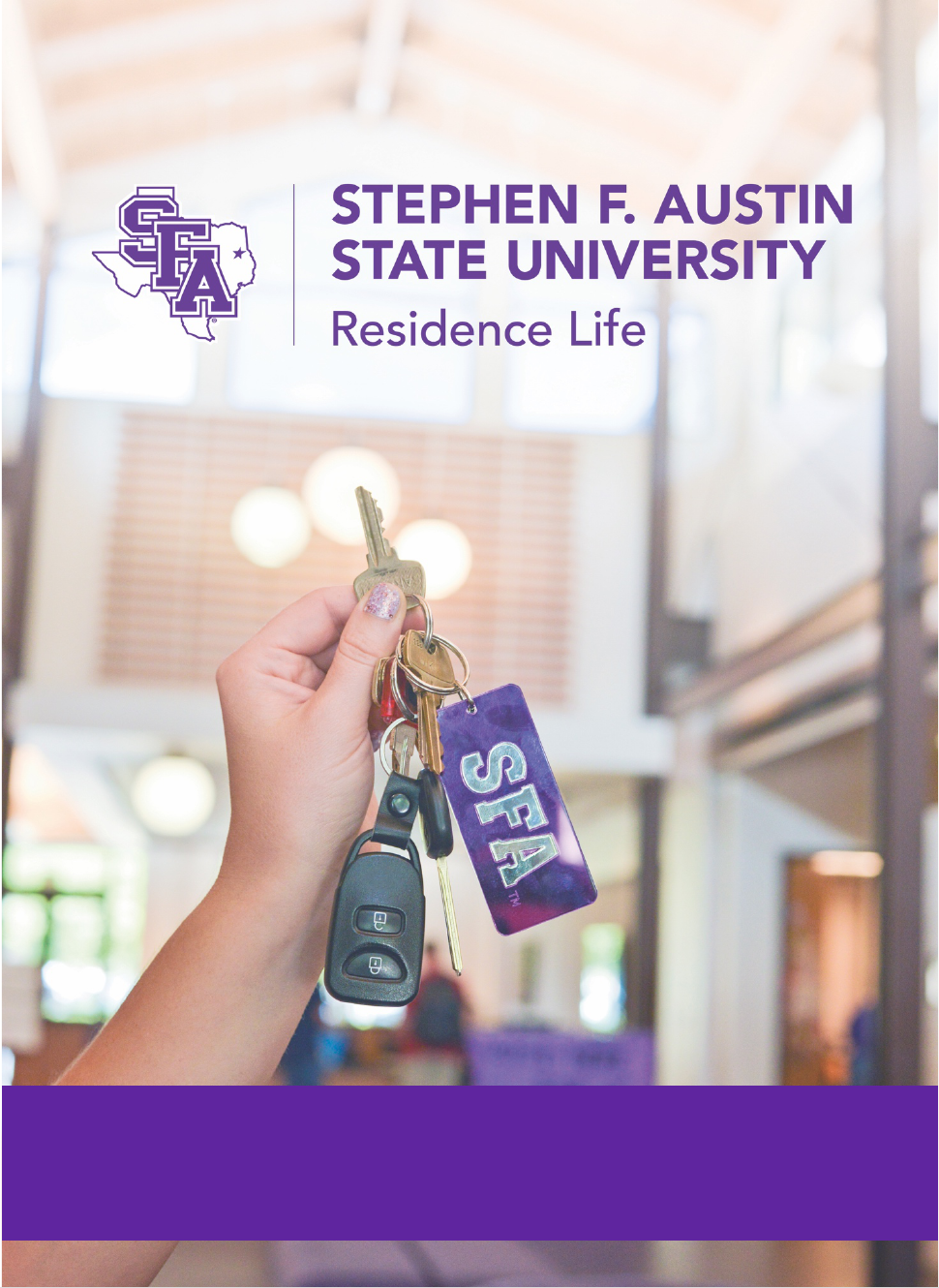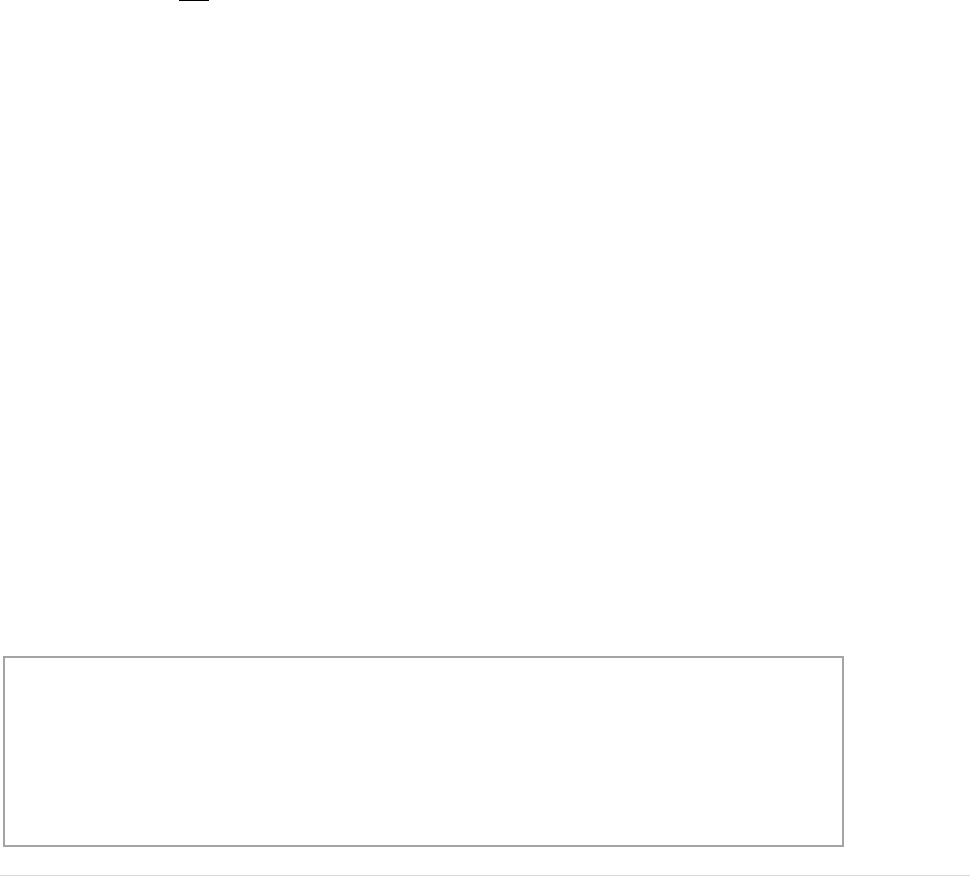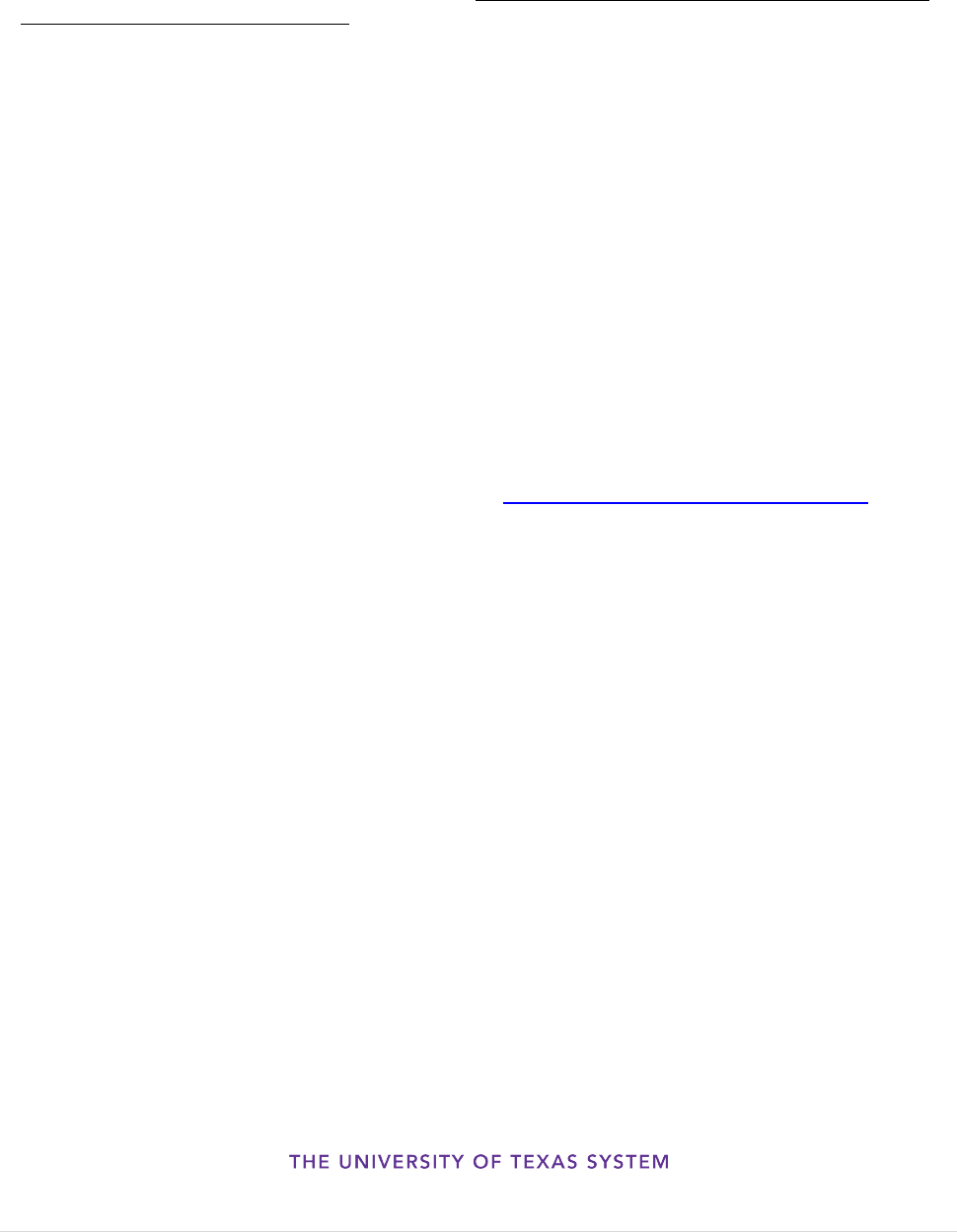
1 | SFA Residence Life
2024–25
Community Guidelines

2 | SFA Residence Life
Quick Guide
Quick Guide ...................................................................................... 2
Welcome from SFA Residence Life .................................................. 3
Mission Statement ..................................................................... 3
Community Commitment ........................................................... 3
Students Are Responsible for Their Own Experience ................... 4
Residence Life Staff .......................................................................... 4
Student Staff ............................................................................... 4
Residence Life Operations ........................................................... 5
Room Entry ................................................................................. 5
Expectation for Consideration of Others ......................................... 6
Roommate and Suitemate Rights .................................................... 7
Health, Safety and Security ............................................................... 7
Emergencies ............................................................................... 7
Electrical Safety Guidelines ....................................................... 11
Health and Wellness Hub (Health Services and Counseling) ..... 13
Obligations ..................................................................................... 14
On-Campus Living Policy ........................................................... 14
Housing Assignments ................................................................ 14
Damages ................................................................................... 18
Check-In/Check-Out
................................................................... 19
Keys/Locks ................................................................................ 19
Housing Contract ...................................................................... 19
Abandoned Property ................................................................. 20
Resident Conduct ........................................................................... 20
Housing Community Standards and Rules ...................................... 23
Prohibited Items ....................................................................... 23
Pets ........................................................................................... 24
Visitation ................................................................................... 25
Noise/Quiet Hours .................................................................... 26
Cooking Guidelines ................................................................... 26
Cleaning .................................................................................... 26
Trash ......................................................................................... 28
Wing/Floor Meetings ................................................................ 28
Solicitation and Advertisement ................................................. 28
Painting ..................................................................................... 28
Identification
Cards .................................................................. 28
Disturbing or Distressing Behaviors ........................................... 28
Decorations .............................................................................. 29
Furnishings ................................................................................ 29
Bicycles/Motorcycles/
Electronic Skateboards
(Hoverboards)
... 30
Offensive Odors ........................................................................ 30
Windows/Window Screens ...................................................... 30
Roofs ......................................................................................... 30
Residence Life Services and Amenities ........................................... 31
Internet Services ....................................................................... 31
Kitchens .................................................................................... 31
Laundry Facilities ....................................................................... 31
Microwave Ovens ..................................................................... 31
Ice Machines ............................................................................. 32
Extermination ........................................................................... 32
Vacuum Cleaners ...................................................................... 32
Vending Machines ..................................................................... 32
Life at SFA ....................................................................................... 32
Dining Services ......................................................................... 32
Meal Plans ................................................................................ 32
Special Interest Facilities ......................................................... 34
University Services ......................................................................... 35
Car Problems ............................................................................. 35
Computer Services .................................................................... 35
Email Communication ............................................................... 35
Parking ...................................................................................... 36
Post Office ................................................................................ 36
Important Phone Numbers ............................................................ 36

3 | SFA Residence Life
Welcome FROM SFA RESIDENCE LIFE
The opportunity to find your place on campus awaits you! Staff members live in each residence hall and are here
to help and support you as you find your place in the community. Our hall staff members are well-trained,
energetic and dedicated to making your on-campus living experience educational and positive. Please do not
hesitate to ask for assistance.
Best wishes for a successful year from Residence Life. Axe ’em, Jacks!
The guidelines included in this handbook are designed to ensure the safety, privacy and rights of all members of
the on-campus community.
Mission Statement
Residence Life, a part of Campus Living, Dining and Auxiliary Enterprises under the Division of Student
Affairs, is an integral part of the educational experience and academic support services of Stephen F. Austin
State University. Its mission is to provide a learner-centered residential environment conducive to the
academic success and personal development of our students. We achieve this by providing services and
programing opportunities that enhance student growth, learning and engagement; providing living/learning
communities that meet student needs; operating facilities that are clean, well-maintained, cost-effective and
adaptive to student needs; and training staff to be positive role models who facilitate student growth,
development and engagement.
Community Commitment
Each on-campus student has the right to live in an atmosphere of positive encouragement and mutual respect. All
residents should be able to:
•
sleep, study and socialize in their rooms without disturbance
•
live in a safe, secure, healthy and clean environment
•
be an active member within a supportive and engaging community
•
and participate in a variety of programs and services that will enhance their campus experience.

4 | SFA Residence Life
Your individual responsibilities are to:
•
comply with the policies and procedures as outlined in the residence hall contract, community
guidelines and university’s Student Code of Conduct
•
consider the needs of other residents and balance them with your own needs
•
provide open communication with other community members and the Residence Life staff
•
become involved in the community through participation in activities and the Residence Hall Association
•
take care of the residence hall and the environment in which you live
•
promote individual and community safety
•
demonstrate dignity and respect for all individuals
•
and respect the opinions of others.
*Adapted from “In Search of Community,” Ernest Boyer, Carnegie Foundation for the Advancement of Teaching
Students Are Responsible for Their Own Experience
The SFA community and Residence Life are committed to providing students with opportunities to make responsible
decisions. Students learn responsibility when they bear the consequences of their actions, and inactions, in an
environment based on caring and support.
Residence Life Staff
The Residence Life staff is available to assist students in creating a caring and supportive environment. Staff
members organize floor meetings, educational programs and individual opportunities to help create successful
students. Residence Life encourages you to participate in community activities and take advantage of all the
conveniences of on- campus living.
Student Staff
Desk Assistants
The DA serves as the first point of contact in our residence halls, provides customer service to residents and guests
during desk hours, and acts as a communication link between staff members and residents. DAs are responsible for
the individual desk shifts in the building they are assigned. They help answer student questions, direct phone calls,
provide information and complete various administrative tasks.
Resident Assistants
The RA is a paraprofessional staff member who has direct and constant contact with residents. RAs are assigned to
floors in the residence halls to act as facilitators for the community and provide programming opportunities to
enhance the social, educational, intellectual and cultural development of each student. They articulate to students
the philosophy and policies of SFA and Residence Life while representing the department as a role model in all
facets of university life.
Senior Resident Assistants
SRAs fulfill the roles and responsibilities of a community assistant as well as greater administrative and leadership
duties within their hall/area.

5 | SFA Residence Life
Professional Staff
Area coordinators, or ACs, and graduate hall directors, or GHDs, are professional employees living in the facility and
are responsible for the entire building/area. The ACs directly supervise the SRAs and RAs. The DAs are supervised
by the GHDs. Both ACs and GHDs serve as resources to help facilitate the educational, social, intellectual and
cultural development of all community members living in the residence hall. Professional Residence Life staff
members are supervised by the associate director of residence education.
Residence Life Operations
Custodial Staff
Residence Life, by and through the Physical Plant Department, employs a full-time custodial staff for the residence
halls. These staff members are responsible for cleaning the common areas in the facilities, including the lobbies,
hallways and community restroom facilities. Students are responsible for cleaning their rooms and suites or private
bathrooms. Residents should report any cleanliness concerns to the front desk. For safety reasons, students may
not enter the restroom/shower facilities when the custodial staff has blocked the entrance for cleaning purposes.
The university wants to provide a clean and healthy environment for all residents.
Maintenance
Students are obligated to report any maintenance problems or safety hazards by using the “Submit a work request
online” link on the Residence Life webpage at sfasu.edu/reslife/current-residents or by reporting them to the front
desk in their building. Maintenance personnel are on duty beginning at 7 a.m. and may require access to rooms early
in the morning.
Residents should cooperate with all maintenance personnel so that repairs may be made as quickly as possible.
The university is not responsible for any damage to a resident’s personal property for any reason.
Extermination
Exterminators will treat the residence halls on a regular basis throughout the year, normally during semester
breaks. Residents must remove live animals from their rooms prior to the treatment. If an attempt is made by the
contractor to exterminate a room and the resident refuses to allow entry, the resident will be assessed a fee to
have the contractor reschedule. If the resident has a medical reason to refuse extermination, a letter from the
resident’s physician must be sent to Residence Life to determine if an alternate treatment may be available.
Information can be obtained from the Physical Plant Department concerning the types of chemicals used and
optional forms of treatment. The university wants to provide a clean and healthy environment for all residents.
Room Entry
Entry into a student’s room by authorized Residence Life personnel
A Residence Life staff member may conduct a general inspection for fire safety, maintenance checks, head counts
(to verify who is living in each room), health and safety, or damage reports prior to the student’s departure.
Routine checks may be made before university holidays, at the beginning and end of each semester, during health
and safety inspections, and prior to checkout of a resident from the room.
Entry into a student’s room does not normally constitute a search. However, staff members do not usually enter a
room without the resident’s consent except to inspect for a potential fire, safety or health hazard; to perform
maintenance; to conduct an inventory of university property; to correct situations intruding upon the comfort of
other residents (a phone or an alarm clock continuously ringing, loud stereos, etc.); to retrieve items upon request

6 | SFA Residence Life
of the resident’s immediate family (under the appropriate circumstances); to retrieve the personal belongings of
another student where there is no apparent dispute as to ownership of the property and where there would
apparently be no undue infringement of privacy; and to enforce Residence Life policies. If entry is made for one of
the above reasons and the resident is not in the room, the staff member will normally leave an explanatory note
stating what occurred. In the case of entry into a large number of rooms, an explanation will be left with the
supervisor. In the event of danger to life and/or property, entry may be made by any authorized university official
or appropriate emergency personnel (fire safety, maintenance, medical technician, police, etc.).
Entry into a student’s room for maintenance purposes
Maintenance personnel or Residence Life staff members may enter a student’s room to perform maintenance or to
determine maintenance needs. The university wants to ensure the safety of residents in their living spaces on campus
by making certain everything is functioning correctly.
Entry into a student’s room by law enforcement personnel
Under ordinary circumstances, a search warrant will be secured and served by the University Police Department,
but a search warrant might, in some instances, be served by another agency. No one may interfere with the service
of a search warrant. If it is necessary to enter a room, a passkey will be provided to the officer. University police
may enter any room without a search warrant when there is reason to believe a situation exists constituting a real
and present danger or harm to people or property. Entry under these provisions shall not be construed as a search.
Under certain circumstances, an officer may conduct a search without a search warrant. These circumstances
include situations when evidence may be destroyed or secreted elsewhere or when it is impractical to secure a
search warrant because of time delay.
An officer may search when the officer believes a crime is being committed in the officer’s presence. The officer
may search the immediate area and the person of anyone arrested, or they may search a room when the occupant
of the room gives voluntary consent. If the officer feels there is a legal basis for a search and voluntary consent is
not given, the officer may tell the person in possession of the room that the officer will maintain control of the
room until a search warrant can be secured. A police officer may contact a member of the Residence Life staff to
accompany them to the student’s room. It is the usual practice of the university police, where practical, to make
the supervisor aware of any police activity in the building, either prior to or in conjunction with the activity.
University police may conduct walk-through patrols in the facilities to reduce theft and vandalism as well as to
provide other protective and safety services.
Expectation for Consideration of Others
The members of your community are unique individuals with different perceptions and values, which may lead to
conflicting interpretations of resident’s rights and responsibilities. When a conflict occurs, it is important to
address the conflict rather than let it escalate. While resolving conflict is often not easy, it can lead to
understanding and respect among community members and help build a positive living environment.
To encourage resolution of conflict by the individuals involved, we ask that you use the guidelines of Consideration
of Others. These guidelines recognize that every member of the community deserves the opportunity to express
their concerns and feelings and to be honest about their rights. A resident is expected to be the first person to
initiate a resolution when they feel their rights are being violated. If the resident feels that their safety is at risk,
they should contact a staff member or UPD.

7 | SFA Residence Life
Residents are encouraged to take initiative on resolving their problems by talking to fellow students about issues.
If the resident has talked to their neighbor about the violation and no action is taken to correct the problem, then
they should consult with a staff member to work out alternatives. A staff member will be able to provide more
information about developing conflict resolution skills.
No person shall, on the basis of race, color, religion, national origin, sex, age, disability, genetic information,
citizenship or veteran status, be subject to unlawful discrimination or be unlawfully excluded from participation in
or denied the benefits of employment or any educational program or activity operated by SFA. As members of the
community, university students enjoy the privileges and share the obligations of the larger university and
Nacogdoches communities. These privileges carry with them the obligations of responsible citizenship. Freedom
of discussion, inquiry and expression is fostered by an environment in which the privileges of citizenship are
protected and the obligations of citizenship are understood.
Roommate and Suitemate Rights
The roommate’s/suitemate’s rights must be given high priority with regard to visitation and respect. The
roommate should not be compelled to leave to accommodate a guest, nor should they be placed in situations that
might cause embarrassment or inconvenience. Roommates/suitemates are encouraged to try to resolve problems
between themselves before involving a community assistant. If the RA is unsuccessful, contact the AC. An
electronic or hard copy of the roommate agreement will be made available to all residents upon move-in.
Health, Safety and Security
Emergencies
Emergencies should be reported to UPD at (936) 468-2608 or (936) 468-9111 and to a staff member. Emergencies
include life-threatening situations, fires, floods, exposed electrical wires or danger to life or property.
UPD
SFA has its own police department on campus that employs full-time, University of Texas System-certified police
officers. UPD is available for services such as contacting a student in an emergency, assisting with dead car
batteries, helping with keys that are locked in a car, providing escort service on campus at night, transporting
students to the hospital or bus station and meeting various other needs as they arise. There are black and white
emergency call boxes located on campus. Students can contact UPD for both emergency and routine calls by
pressing a button on these phones. Students may access the UPD website for crime information and safety tips at
sfasu.edu/UPD. For more information, call (936) 468-2608.
Rave Guardian Mobile App/Jack Alert Emergency Notification System
UPD encourages the use of the Rave Guardian smartphone app designed to enhance the safety of everyone in the
campus community. The campuswide Jack Alert system and all other campus emergency notifications appear on
Rave Guardian. To download Rave Guardian, go to sfasu.edu/UPD.
The Jack Alert emergency notification system is designed to alert the campus in case of an imminent threat. Sirens
for the centrally located outdoor alert system are installed on the roof of the Steen Library to ensure the alert

8 | SFA Residence Life
sound may be heard across the main university campus. While the alert system may be heard inside some
buildings on campus, the system is designed to provide an audible alert outdoors. Specific details about this policy
may be found on sfasu.edu/upd/emergency-management/jack-alert.
Emergency Call Boxes
Emergency call boxes have been placed at various locations on the SFA campus. These call boxes are black and
white and are labeled "POLICE" in black letters. Operation is easy. Push the appropriate button and talk directly
into the speaker when the call is answered. The call goes directly to the UPD Communications Center. Call boxes
can be used to request police assistance and escorts, assistance with vehicle problems, and information.
Evacuation Process
In most cases, an evacuation applies only to the buildings immediately affected by an emergency. In some cases,
such as local terrorism, flooding, hurricane or earthquake, the evacuation may apply to the entire campus. Some of
the events that might call for an evacuation may also require sheltering in place based on your proximity to the
event. Heed official requests, and use common sense when you cannot receive an official announcement.
Occupants are required to evacuate the building when an emergency alarm is activated. If an alarm sounds,
evacuate to the locations listed on the following page. Failure to follow these procedures will result in disciplinary
action and/or a damage charge assessment. Residents should refer to
sfasu.edu/upd/emergency-management for up-to-date information.

9 | SFA Residence Life
EVACUATION LOCATIONS
•
Lumberjack Lodge — across the parking lot to the grassy area near Hall 14
•
Wisely — across Aikman Drive between the Austin and Boynton buildings
•
North and South —across the parking lot to the horseshoe area
•
Lumberjack Village
o
Building 1: west side — exit to the parking garage; east side — exit to Clark Street
o
Building 2: across Clark Street
o
Building 3: exit to the parking garage
•
Hall 10 — across the parking lot to the horseshoe area
•
Hall 14 — across the parking lot or on the far side of East College Eatery
•
Griffith — (front) across the parking lot into the yard area, (back) across the street to the opposite parking lot
•
Steen — Lot 24/stadium
•
Kerr — across the parking lot into the yard area
•
Hall 20 — across the grassy area between the pond and stadium or to the commuter parking lot
•
Lumberjack Landing — across to library parking lot, west of building
Fire Alarms and Fire Drills
Residents are required to evacuate the building or area when instructed by a university authority, police officer or
firefighter or when a fire or smoke alarm sounds. Please note that after fire drills, Residence Life staff will walk the
buildings for any fire safety violations, including failure to evacuate, before anyone is allowed back into the building.
Residence Life staff, in cooperation with the Environmental Health, Safety and Risk Management Department, will
conduct fire and life safety inspections in coordination with scheduled fire drills at least twice per academic year.
The intent of the inspections is to increase residents’ awareness of safety issues and the fire and life safety rules
found in these community guidelines. Safety officers and Residence Life staff look for the following during the
inspection:
•
Residents who do not heed the fire alarm will be fined $50 for the first offense and $100 for the second
offense; monies from fines go to a safety programming fund.
•
Entrances/exits must be free of obstruction. Furniture may not block windows, and doors must be able to
open 90 degrees without interference.
•
Room windows will be checked to ensure they are a viable point of exit and/or way of notifying emergency
responders of your presence in the room. Do not block your windows with furniture.
•
All storage items must be at least 18 inches below the ceiling.
•
Electrical items will be checked for proper usage and storage — extension cord misuse, electrical cover
plate missing/damaged, electrical wiring frayed/damaged/crimped, multi adapter without breaker in use,
prohibited/unapproved appliances, microwave/refrigerator not plugged directly into wall.
•
All stove tops and ovens must be free of foil and kept clean at all times. Foil serves as a source of grease
buildup around the stove top that may be a potential fire hazard.
•
Fire alarm equipment must operate correctly — smoke detector obstructed (minimum 24-inch clearance),
smoke detector damaged, blocked sprinkler heads.
•
Ignition sources/combustible products must be handled properly — candles/incense being present in the
room, flammable liquids in the room, combustible materials near electrical source, and excessive fire load in
the room.
•
Emergency evacuation route must be designated and ready — absence of the evacuation plan on
the back of the room door, windows/doors obstructed.
•
Miscellaneous items that may cause safety issues — poor housekeeping, floor/wall/ceiling penetrations,
the door closure missing/damaged and illegal appliances present in room/apartment.

10 | SFA Residence Life
To prepare for potential fire emergencies, learn the locations of fire extinguishers, exits and manual pull stations in
the area, and be sure to know how to use them. Tampering with safety equipment and/or transmission of a false
alarm is a Class A misdemeanor violation of state law, and violators may be charged in the appropriate civil court.
Students may be charged for all costs associated with tampering with safety equipment and/or setting off a false
fire alarm. The minimum charge for fire alarm activation is $125. Starting a fire on a university campus is a felony.
Students may be referred to the Student Conduct office and receive disciplinary actions that may result in
suspension from the university.
PLEASE NOTE: The fire alarm systems are very sensitive. Fire alarms may be set off by the use of hair appliances,
steam from the shower, smoke or cooking. You may be warned for a first offense. Additional alarm activations
may result in sanctions and/or fines.
Fire or Alarm Activation Procedure
1.
If an emergency exists, activate the manual pull station building alarm system. IMMEDIATELY contact UPD
at 911 from a campus phone or (936) 468-2608 from a cellphone.
2.
Evacuate when prompted by continuous sounding fire alarms or by an official announcement.
3.
Be aware of, and make use of, designated primary and alternate evacuation routes.
4.
Leave the building in an orderly manner without rushing or crowding. DO NOT USE THE ELEVATOR
DURING A FIRE. If you are unable to exit through the stairwell, remain in a safe zone until emergency
personnel are able to assist you.
5.
Provide aid to those who need it in an emergency evacuation situation.
6.
Smoke is the greatest danger in a fire, so stay near the floor where air may be less toxic. If the hallway is
too smoky to use, stay in your room. Keep the door closed. Use towels to fill in cracks around the door, air
conditioning outlet, etc. Open the window, and put your face near the opening to breathe. Wave a towel
or sheet from the window to attract attention.
7.
Upon evacuation to the predetermined locations listed previously, be observant of emergency vehicles.
8.
Report any individuals who have been injured or left behind to emergency responders.
9.
If requested, assist emergency crews.
10.
DO NOT RETURN TO AN EVACUATED BUILDING until an all-clear is officially announced.
NOTE: Should you become trapped inside a building during a fire and a window is available, place an article of
clothing (shirt, coat, etc.) outside the window as a marker for rescue crews. If there is no window, stay near the
floor where the air may be less toxic. Shout at regular intervals to alert emergency crews of your location.
Severe Weather
Local radio and television stations announce tornado watches when the weather conditions are right for a tornado
but none have been sighted, tornado warnings when a tornado has been sighted, and storm alerts when a severe
thunderstorm is approaching. The university warning sirens may sound in cases of severe weather or during testing
periods. For more information, visit sfasu.edu/safety.
Severe Weather or Tornado Warning Procedure
Seek shelter immediately in designated areas. Check sfasu.edu for up-to-date information.
If inside a building:
1.
go to the lowest level of the building, if possible
2.
stay away from windows
3.
go to an interior hallway
4.
use your arms to protect your head and neck in a “drop-and-tuck” position

11 | SFA Residence Life
5.
and avoid the most dangerous locations of a building, usually along the south and west sides and at corners.
If there is no time to get inside:
1)
lie in a ditch or low-lying area, or crouch near a strong building
2)
be aware of potential for flooding
3)
use your arms to protect your head and neck in a “drop-and-tuck” position
4)
and use a jacket, cap, backpack or any similar items, if available, to protect your face and eyes.
Electrical Safety Guidelines
You are encouraged to follow safety precautions at all times. The following are electrical safety tips for campus
community living:
•
Do not overload power strips or outlets. When cords overheat, they quickly deteriorate and cause a
potential shock/fire hazard.
•
Use a power strip with a built-in circuit breaker, which will shut off power automatically if there is too
much current being drawn.
•
Be wary of electrical outlets that get too hot to touch. If it feels warm, unplug all appliances and enter a
work order at the front desk immediately.
•
Do not connect multiple power strips. Do not route cords under doors or carpet; this could cause them to
overheat or ignite.
•
Do not staple cords; this could damage the insulation and expose wire.
•
Use light bulbs with correct wattage for lamps.
•
Halogen lights/lamps are not permitted on campus.
•
Never plug more than one high-wattage appliance into a single outlet (e.g., hair straightener, iron).
•
Check all appliances for frayed or cracked cords, and replace them if damage is present.
•
If the power goes out in your room, immediately report this to the front desk.
•
Become familiar with the location of the nearest fire extinguisher, and know how to use it.
Electrical Power Strips and Extension Cords
Residents must use surge protectors (electrical power strips with built-in circuit breakers; power strips without
circuit breakers are not allowed) approved by the Underwriters Laboratory, or UL. Multiple plug adapters, splitters
and extension cords are not permitted. Follow the electrical safety guidelines above.
Wiring
Students may not set up computer networking between rooms in the residence halls. To maintain the exterior
physical condition of the facilities, as well as for security reasons, exterior wiring, satellite equipment and antennas
are not permitted. All residence hall rooms on campus have wireless internet connectivity.
Personal Property/Insurance/Personal Liability
On-campus residents’ belongings are not protected by the university from theft, vandalism, fire, sprinkler system
activation, maintenance failure or for any other reason. Maintenance failure does not constitute a reason for a
refund. The university strongly encourages students to either make arrangements with their parent’s or
guardian’s homeowner’s insurance company to insure personal belongings OR purchase a separate personal
property insurance or renter’s insurance policy. In some cases, a parent’s homeowner’s insurance will cover
damage to personal property in a state-owned residence hall, but this is not always the case. Items of value
should be marked for identification and serial numbers recorded. UPD has engraving tools available for student use.

12 | SFA Residence Life
Students should secure medical insurance coverage for themselves, as well. The university does not provide theft or
damage insurance for residents, so each occupant is encouraged to purchase some type of personal property
insurance.
Safety Inspections
Residence Life staff members conduct regular health and safety inspections in all residence hall rooms. The
purpose of the inspection is to ensure the residents’ safety and assess the condition of each room. Students in
possession of prohibited items will be subject to the student conduct process. Notice of inspection dates will be
posted prior to the scheduled inspection. The Environmental Health, Safety and Risk Management Department, as
well as the state fire marshal, may conduct random room inspections throughout the semester.
Candles/Open Flames/Plug-in Air Fresheners
As stated in the NFPA 1 Fire Code and NFPA 101 Life Safety Code, by order of the state fire marshal and SFA’s Fire
and Life Safety Policy, candles (with or without wicks), candle warmers, wax warmers (Scentsy), potpourri pots,
incense, oil lamps, lava lamps, plug-in oil air fresheners (including Wallflowers), and other devices that use an open
flame are not permitted in rooms, for decoration or for any other purpose. Wax-hand sculptures are approved.
Residence Life staff members and the Environmental Health, Safety and Risk Management Department may
confiscate any of these items. Students found in violation of this policy will face disciplinary action, and a fee may
be charged to the student’s account.
Safety Equipment
The university wants to protect the residents on campus, and tampering with safety equipment may impede
emergency procedures. Any student found to be responsible for the misuse of any safety equipment, including
emergency lights, emergency exits, exit signs, smoke/heat detectors, sprinkler systems, fire panels, electrical
panels, fire extinguishers and public area lighting, will be assessed a minimum $75 fine and be subject to further
disciplinary action. Fire extinguishers are installed in all residence halls for utilization during a fire event. If an
extinguisher is maliciously discharged, a fee for refilling the extinguisher and for cleanup will be assessed and
disciplinary action will be taken. Tampering with any part of a fire extinguisher in the absence of a fire, including
the pull pin, removing the extinguisher from its bracket/cabinet or the wall, or damaging the bracket adhering it to
the wall, will result in a safety violation charge. All residence halls have a sprinkler system that is connected to the
fire alarm panel at the front desk. Students who put objects into the sprinkler devices may activate the sprinkler
system, causing major damage to the building. Anyone found tampering with or activating sprinkler system
equipment will be processed through the disciplinary system and will be held responsible for any associated
damage charges to the room and/or building. SFA employees will conduct routine safety checks to determine that
safety equipment is in working condition and that health and safety violations are not present in the building.
Students should report any problem associated with any safety equipment to the front desk immediately (e.g.,
discharged fire extinguisher or malfunctioning equipment).
Video Cameras
Video cameras have been installed in public areas of some residence halls to monitor activity and reduce
vandalism. Cameras may be installed in entryways, lobbies, laundry rooms, elevators, vending rooms and other
common areas. Cameras may be monitored by UPD to enhance personal and building security.
Door Systems
Self-Closing Doors

13 | SFA Residence Life
According to the National Fire Protection Agency 101 - Life Safety Code, each resident’s room door that opens to
the interior corridor shall be self-closing. Self-closing devices have been installed on all residents’ room doors to
reduce the chance of a fire extending into the rest of the building. Do not tamper with or remove these devices.
Damage to these devices will be treated as a serious matter, and replacement costs will be billed to those
responsible.
Computerized Door System/Card Reader
All residence halls except Hall 20 have a computerized access door security system. When the main entrance
doors are locked, a student may gain entry into the building by inserting the student ID card into the card reader
located next to the front door outside each building. Exterior doors are locked 24/7 except in Lumberjack Landing.
If for any reason the system will not allow the resident to enter, or if the resident’s ID card is not available, the
resident should call the duty phone number posted on all exterior doors to gain assistance from the staff member
on duty. UPD also may be contacted from the phone located next to the card reader if a staff member cannot be
contacted. The university wants to protect the residents on campus. At no time should a resident give their ID card
to another person for use.
Propping Open Doors and
“
Tailgating
”
Do not allow anyone to follow you inside your building (tailgating) when the doors are locked. Never prop open any
doors in the building. Take all safety precautions to ensure your safety and the safety of others in your community.
FERPA
The Family Educational Rights and Privacy Act (20 U.S.C.£ 1232g; 34 CFR Part 99) is a federal law that protects the
privacy of student education records. In accordance with FERPA guidelines, Residence Life staff do not share any
resident information other than directory information (including address, email address, phone numbers, etc.)
with anyone outside the university system. This includes, but is not limited to, information about grades,
behavioral history, health concerns and financial information. Exceptions to this act, regardless of age, will be
made in life-threatening situations.
Directory Information
The front desk is authorized to release students’ phone numbers to callers requesting this information. This
information may be denied by a request from a student to the AC. Directory information will be disclosed at the
universitywide level unless the student notifies the Office of the Registrar in writing by the 12
th
class day of a fall or
spring semester, the fourth day of a summer semester, or the third day of any quarter.
Health and Wellness Hub (Health Services and Counseling)
The Health and Wellness Hub offers comprehensive services that treat the whole person – mind, body, and spirit.
Located in the Tucker Building at the corner of Raguet and East College streets, The Hub houses Health Services,
Counseling Services, Student Outreach and Support, the Lumberjack Pantry, dietary assistance, and access to
services at the Family Crisis Center of East Texas.
Health Services operates as an outpatient clinic staffed by a licensed medical provider, nurse, and laboratory
and administrative personnel. They offer medical care similar to what you would receive from your
family physician. Services are provided at little or no charge to students. Clinic hours are from 8 a.m. to 5 p.m.
weekdays. Students should make an appointment to visit the clinic by calling (936) 468-4008.
Professional counseling can take a variety of forms. Professional counselors help students identify goals and
potential solutions to problems that cause distress, improve self-esteem, increase coping skills, and promote social
connectedness and optimal mental health. SFA offers brief interventions with the focus on individualized care to any
enrolled SFA student. The services are free and confidential. Counseling hours are from 8 a.m. to 5 p.m. weekdays.
Students should make an appointment by calling (936) 468-2401

14 | SFA Residence Life
If you are sick or hurt and need help, contact the on-call Residence Life staff member. The staff member will
contact UPD for assistance, if necessary. If transportation to the hospital is required, UPD will either transport you
or call an ambulance. Ambulance transportation will be at your expense.
Obligations
On-Campus Living Policy
Living on campus provides an opportunity to discover the full university experience and teaches you to live
independently while still providing the support you need to grow as a person and adult. National studies show that
students who live on campus consistently have higher GPAs, adjust better in college and are more successful in
their college education. Living on campus is an integral part of the educational process.
Students who are younger than 21 years of age and have earned less than 60 hours of coursework are required to
reside and dine on campus. On-campus residents also must rent a campus post office box. Exceptions to this policy
are made for students who:
1. commute from the permanent address of an approved relative within 60 miles
2. are married
3. have custody of a child
4. have a medical disability (as defined by the Americans with Disability Act) that cannot be accommodated
on campus
5. are registered for eight hours or less
6. own property (or have a parent who owns property) in Nacogdoches County
7. or exclusively take online courses.
The procedure for obtaining off-campus permission begins with the student filing for eligibility at the Residence
Life office in the Lumberjack Village Community Center, Room 108, or via their mySFA account. If permission is
granted, the student is provided an off-campus permit.
The university has a residency requirement appeals committee who regularly meets to review, upon the student’s
request, denied permits. Students who are not approved to live off campus will be billed for housing. The
university reserves the right to terminate any off-campus permission. Failure to comply with on-campus
requirements could result in suspension or being barred from registration. By accepting an assignment in any
building, the student assumes responsibility for becoming familiar with and abiding by all rules and regulations.
Classes
All on-campus residents must be full-time students (12 credits for undergraduate; six credits for graduate) each
semester to maintain eligibility to reside in campus housing. Students enrolled in less than 12 credit hours must seek
approval to stay in campus housing.
Housing Assignments
Students who have applied for housing and been accepted for academic admission to the university will be eligible
to select a space on campus. First priority of room selection is given to students who have resided on campus the
preceding contract period. Second priority is given to new applicants based on the date the residence hall
application and deposit are received. Registered sex offenders are not permitted to reside on campus.

15 | SFA Residence Life
Special Accommodations
Students needing special accommodations in a residence hall facility must submit an online application through the
Office of Disability Services website, along with documentation that verifies their eligibility as a person with a
disability and clearly explains why the requested accommodation is necessary to provide equal access to their living
environment. Completion of the application is necessary to provide reasonable accommodations for students with
documented disabilities.
At the beginning of each semester, Residence Life will provide the AC, the UPD and emergency personnel with a
list of residents who have a documented disability and who have been provided special accommodations. This
information will assist in identifying students in emergency situations. Once a student has been given special
accommodations, these accommodations will be maintained each semester the student lives on campus. If a
student requests to transfer to another residence hall, he/she needs to contact Residence Life to see if an
accessible room is available. The student will be responsible for covering the difference in any room costs.
Students requesting academic accommodations are asked to contact the Office of Disability Services. Residence
Life attempts to accommodate all students on campus.
Emotional Support Animals
SFA may allow animals that assist or provide therapeutic/emotional benefits to a student with a documented
disability. Students must complete the special accommodation request form on the Office of Disability Services
website to begin the request process. Emotional support animals should be approved prior to bringing on
campus. University personnel may require the removal of animals if they are not properly maintained, present
health or safety hazards, or are disruptive to other residents.
Temporary Disabilities
Residence Life will attempt to work with a student with a temporary disability to move them to another room
upon request, if the space is available, just as any student would be allowed to move. If the student needs
assistance that cannot be provided by a normal move, they should contact Residence Life for more information.
Consolidation Policy/Vacancy in a Room
Residence Life reserves the right to consolidate any student who, for whatever reason, is left without a roommate
during the year or after the priority sign-up process for the upcoming semester. Consolidation is a process through
which Residence Life allocates the maximum amount of space to residents in the residence halls. The process
affects residents during the first three weeks of the academic semester who live alone in a double occupancy room
because a roommate does not arrive or moves out of the room. If we are unable to assign another person to fill
the open space, it becomes necessary for residents who do not have roommates to consolidate (move together).
If a resident in a double-occupancy residence hall does not have a roommate, the resident will be expected to
accept one of the following options:
a)
Elect to pay the additional fee for the private room (between $600 to $750 per semester depending upon your
assignment), if space is available.
b)
Choose to move to another half-occupied room in the same building.
c)
Find another student willing to move into the room.
All room changes are made at the discretion of the central assignment staff and/or AC.
It is the student’s responsibility to find a roommate when consolidation is necessary. All residents who live alone in
a double-occupancy room and do not wish to pay the additional fee for a private room may be given an
opportunity to meet a new roommate through a hosted event. All residents in single rooms are invited to meet and

16 | SFA Residence Life
mingle to find a new roommate. In the event that you do not meet a roommate on your own, the AC will
consolidate you with another student.
A resident who is occupying a double-occupancy space without a roommate, and is not opting to pay the
additional private room fee, the resident must:
a) Keep the unoccupied half of the room in such condition that would allow someone to move into
the room at any time.
b) Display an attitude of cooperation and acceptance toward any resident who may examine the
room prior to considering occupancy.
c) Agree the room may be shown to prospective occupants without prior notification and in his/her
absence.
d) Agree to accept a roommate assigned by the AC.
Students living in single-occupancy rooms within shared suites (Lumberjack Lodge and Lumberjack Village) where
the other bedrooms may be vacant must be ready at any time for a suite-mate to be assigned.
Residence Life reserves the right to require students without roommates to acquire roommates in order to: (1)
better meet the demand for students requesting to room together, (2) better meet the demand for private rooms,
(3) allow for maintenance repairs, (4) make space available for the housing of special groups, (5) reduce the cost of
utilities or (6) facilitate cleaning.
Private Rooms
Private rooms in double-occupancy residence halls are available, as space permits, for an additional charge each
semester. Community-style facilities are charged an additional $600 per semester, and private and suite-style
accommodations are charged $750. Contact the front desk or AC, or reference the Residence Life website for more
information and specific dates.
Room and Building Changes
If you wish to make a room change within the building, contact your AC. Any resident requesting a new roommate
will usually be required to change rooms. Contact a staff member to complete the paperwork for changing rooms
or checking in or out of your room. If space is available, you are permitted to transfer to another building during
facility transfer days. Transfers must be complete by the dates set by Residence Life. In order for the university to
be aware of the location of each student on campus for security reasons, specific times are allocated for changing
rooms and/or buildings.
Room Selection Process After the First Year
Current, returning residents, have priority to reserve their current space for the next contract period (except in the
first-year halls). Students requesting to transfer to another building the following year may submit their request
during the priority sign-up/cancellation period. Rooms are reserved for the next year by completing the contract
renewal process. Students who do not properly complete the renewal process may be reassigned to any available
room or building.
The university may cancel the residence hall contract if the student is placed on academic suspension. If re-
admission is granted at a later date, the student must re-apply to live on campus unless he/she meets the criteria
and receives an off-campus permit.
Students who are accepted late, apply to live on campus late, fail to complete their contract by the deadline, or have
been suspended and re-admitted late may not receive a permanent assignment until after the first day of class.

17 | SFA Residence Life
Housing During Break Periods
Residence halls may be closed for winter break and spring break. However, Residence Life offers temporary
housing (Break Housing) to residence hall students who need a place to stay when the university is closed. Rooms
are offered, as space permits, and may require staying in a different building. Students must sign up and pay an
extra fee for the time they reserve a space during the break. Students needing break housing should make their
request on their mySFA account. Room fees do not cover holiday break periods. The meal plan is not available
during break periods.

18 | SFA Residence Life
Damages
Students are responsible for completing an inventory document that accounts for all existing damage to the room
when they check-in. Students are responsible for any damage caused to their living area during the time they are
assigned to that space. Students will be charged for any damage to their room and/or furnishings that were not
present and/or noted when they moved in. This includes the window, window screen and both sides of the front
door. Residence Life does not endorse the use of Command Strips or any adhesive that may remove paint from the
wall. Any adhesive that removes paint will result in a damage charge. If another student is suspected of causing the
damage, the charges may be transferred if the UPD is able to verify the allegations. All residents are expected to care
for university property and report damages immediately. Damages, either intentional or accidental, may result in the
student(s) responsible being billed. The university is not responsible for any damage to a student’s room or a
student’s personal effects as a result of theft, vandalism, fire, sprinkler system activation or maintenance failure.
Maintenance problems do not constitute a reason for a refund. Students are responsible for providing property
insurance for personal possessions. Below is a list of the most common cleaning and damage charges. Damage
charges may be appealed through the judicial process via the AC. Charges billed at the end of the semester should
be appealed through Residence Life.
Price List
The following are minimum cleaning and/or replacement charges. These prices may increase based on the specific
room condition.
Estimated Cost
Full Room Cleaning Cost
Adhesives
$100
Hall 14, Griffith, Kerr
$300
Bathroom Cleaning
$125
Lumberjack Lodge
$550
Blinds
$75-$125
Lumberjack Landing
$500
Candle/Safety
Violation
$75
Lumberjack Village #1 or 2
$550
Carpet Square Replacement
$65 (min.)
Lumberjack Village #3
$650
Chair Damage
$129
Wisely or Steen Halls
$475
Drawer
$80 (min.)
Fire Alarm Activation
$125 (min.)
Floors
$75
Furniture Replacement
$150 to $679
Improper Check out
Couch
$679
Leaving without
Desk
$270
Checking out with a
$75
Dresser
$296
Staff member
Bed Frame
$240
Twin Mattress
$150
Full Mattress
$180
Holes:
Nail Hole
$45 + $2 per hole
Hole in Wall
$100 per sq. ft.
Key
$70
Microwave (clean/replace)
$75/$175 (min.)
Mirror
$70 (min.)
Paint
$125 (min.) per wall
Peep Hole
$60
Pet (exterminator fees)
$90
Refrigerator (clean/replace)
$125/$563 (min.)
Room Number Sign
$65 (min)
Screen Replacement
$70
Stove (clean/replace)
$125/$265 (min.)
Trash Removal
$75

19 | SFA Residence Life
Check-In/Check-Out
Residents begin the check-in process by reporting to the front desk before moving into their room. Students may
check-in between 10 a.m. to 8 p.m. The resident must be the person who actually checks into the room; a parent
or friend may not complete the paperwork portion of this process for the resident. During check-in, students
complete an online inventory sheet on which they list all damages, missing furniture and any other irregularities in
the room they might be charged for later. Residents will complete their inventory sheet by clicking on the Online
Room Inspection link at the top of the Residence Life Services link on their mySFA account. The resident is
responsible for ensuring all damages are recorded. Failure to do so may result in damage charge assessments at
check-out. Residents will be held financially responsible for damages that occur within their room not documented
prior to moving in. Once the inspection has been submitted, it cannot be changed.
When the resident moves out, they must check-out with a staff member and complete the following procedures:
1. Leave the room clean, 2. accompany the staff member during the room inspection, 3. complete the online
inventory sheet and 4. return the key. Failure to follow these procedures may result in the student being assessed
a fee for the cleaning of the room, replacement of the key and continuation of the room fees. Students who do not
check out with a staff member, do not check out on time or do not properly move rooms may be charged an
improper check-out fee. Students may not check-out prior to the end of the contract period unless they are
withdrawing from the university or have authorization from Residence Life. Students must have canceled their
residence hall reservation prior to being authorized to move out. Vacating without Residence Life’s authorization
may result in continuation of residence hall fees, forfeiture of deposit and contract- break-fee penalties. Students
may be required to vacate their room within 24 hours of their last final exam, unless the exam is on the last day of
scheduled exams, in which case the student must vacate on graduation day (by 5 p.m. in December and May).
Keys/Locks
Keys are issued during the check-in process. Students should lock their door each time they leave their room.
Students may not loan their key or ID to anyone. Students should report lost keys to the front desk immediately. A
fee will be assessed to change the lock and make new keys each time a key is lost. Locks are changed on front
doors and closets (if applicable) only. Students who live in facilities with card access and lose their ID should have a
new ID card made in the Card Services office in the Baker Pattillo Student Center. Residents are not allowed to
install additional deadbolts on any doors, including suite bathroom doors. Students are allowed to borrow a key
from the front desk for a period of 15 minutes if they are locked out of their room. It is a violation of university
policy to duplicate any university- issued key.
Housing Contract
All students must complete a residence hall contract for the period of time they reside on campus. Contracts are
available under the “Campus Life” tab on the student’s mySFA account – “Residence Life Services” section.
Returning students must renew each contract period but are not required to pay an additional deposit. Students
who want to cancel their contract must do so (online) by the dates specified on the Residence Life website in
order to break their contract without penalties. If a cancellation is made after the appropriate deadline, the entire
room deposit is forfeited, and the student may be charged a contract-break fee. All residents must participate in
the priority sign-up/cancellation process each spring to complete contracts for the upcoming contract period or to
notify Residence Life they will not be residing on campus the following contract period. Important dates and
cancellation information will be listed on the Residence Life website.

20 | SFA Residence Life
Residents who do not participate in priority sign-up/cancellation will have a hold placed on their account and may
lose their current assignment for the upcoming year. Reference “Reserving Rooms” for more information. In order
to assign and re-assign spaces, Residence Life must be notified by the student of his/her future plans according to
the contract guidelines.
Deposit
A $100 residence hall deposit must be received from all residents when they apply to live on campus. Contract
renewals do not require an additional deposit. The deposit will remain on file as long as the student resides on
campus.
Residence hall deposit refunds must be requested online in the “Residence Life Services” section of the student’s
mySFA account by the appropriate deadline. The deposit will be forfeited if the resident moves out prior to the end
of the contract period or fails to cancel his/her on-campus reservation as outlined in the residence hall contract. The
deposit, less deductions for damage, cleaning fees or other delinquencies, will be refunded to residents who
submit a cancellation by the appropriate deadline. Residence hall deposits will be credited to the student’s
university tuition/fee account four to six weeks after the move-out date. Refunds will be issued for any credit
balance remaining on the tuition/fee account after the deposit is applied. The room deposit reserves the student’s
space on campus.
Abandoned Property
SFA, Residence Life and university staff members are not responsible for any student property left in any building.
If property of value is found, it will be removed and stored for 90 days. Items found in common areas in which the
owner cannot be identified may be disposed of immediately. If items are stored, the student will be charged an
abandoned property fee. If the property is not claimed in 90 days, it will be disposed of. The university is not
responsible for property students leave after they have moved out of a residence hall.
Resident Conduct
Alcohol
To legally possess or consume alcohol in the State of Texas, you must be at least 21 years of age. Because the
majority of those living in residence halls are under 21, there are limits to alcohol possession, consumption and
distribution, even if you are at least 21. (HOPS:05-521 (D))
If you are at least 21, you may possess or consume alcohol responsibly within the following limits:
1. You may only possess a reasonable amount of alcohol that is less than or equal to 14% alcohol by volume.
2. All alcohol must be stored and consumed within your private bedroom or in the bedroom of another
resident who is 21 years old, unless all occupants assigned to the same unit are 21 years of age then
alcohol may be stored or consumed in the common living area.
3. Consumption or possession of alcoholic beverages in open containers is prohibited in the corridors and
common areas, such as lounges or lobbies, of university residence facilities. Alcohol transported through
public areas must be unopened.
4. It is the responsibility of the resident who is 21 years old to ensure underage guests, other residents, or
underage roommates do not have access to any alcohol they possess.
5. University police or residence life staff may request proof of identification and age for anyone in possession
or for all present where alcohol is being consumed. Everyone present must comply with the request of the
staff member or be found in violation of the policy and subject to disciplinary sanctions or removal from
campus. Proof of identification and age includes providing a valid driver’s license or a valid passport along
with a current SFA ID card, if a student.

21 | SFA Residence Life
In conjunction with this expectation and the Student Code of Conduct, the following behaviors and similar
behaviors not listed are restricted:
• drinking directly from multiple serving containers
• using common source containers such as kegs, party balls, water jugs, etc.
• playing drinking games or any activities that promote excessive alcohol consumption, including BORGs
• possessing or using party game items such as beer bongs, beer pong, etc.
• and using alcohol bottles/cans as decoration.
Drugs
It is the policy of SFA that any unlawful manufacture, possession or delivery of any controlled substance or illegal
drug is strictly prohibited. The student conduct code also prohibits possession of drug paraphernalia. Moreover, it
is the policy of the state of Texas and of this university that this institution will be as free of illegal drugs as it can
possibly be. Therefore, in accordance with state law and university policy, any student who is determined, through
regular disciplinary procedures of the university, to have violated this policy may be suspended for a period of time
(not to exceed two calendar years, but no less than the remainder of the current semester). This policy enforces
state law.
Weapons
Students may NOT bring into the residence halls any device meant to fire projectiles, or any other
weapon that may be hazardous to the health or safety of residents. Prohibited items include, but are not
limited to, firearms (including rifles, shotguns, handguns*, pellet guns, air rifles and BB guns),
ammunition, stun guns, Tasers, paintball guns, blow guns, sling shots, arrows, bows, axes, machetes,
throwing stars, firecrackers, hazardous chemicals and flammable liquids, and knives with a blade over 5.5
inches. House Bill 446 states nunchucks are legal in public spaces, gyms, and inside facilities. This policy
enforces state law, and university police may confiscate these items. Possession of prohibited weapons or
explosives may lead to disciplinary action, including suspension.
*Those individuals who may lawfully carry and possess a handgun may do so in compliance with HOP 05-
509. SFA students may store a handgun in campus housing, except during extended periods of absence,
such as spring break and the periods between fall and spring semesters. When storing a handgun in
campus housing, the weapon owner must store the handgun in his/her residential room in a secured area
or occupant-provided locked and secure container, or at UPD. Handguns may not be stored in designated
campus housing during summer camps or other events attended by minors. Handguns may never be
stored in campus housing by any person other than the licensed residential-room occupant. Residents
may not store a handgun for any other resident or person. Students who do not want to live with a
licensed weapon-permit holder may contact the AC to request a room change.
An individual employed as a full-time residential staff in campus housing may store his/her handgun in
his/her residence at all times in a secure area or resident-provided locked, secure container.
Students who do not want to live with a licensed weapon-permit holder may contact the AC to request a room
change.

22 | SFA Residence Life
Sexual Harassment and Sex- and Gender-Based Discrimination
If you, or someone you know, is experiencing sexual harassment, you have to option to contact the Office of Title IX
for support. The Title IX office provides support for individual impacted be sex-and gender-based discrimination
through SFA HOP 01-307: Title IX. Sex- and gender- based discrimination includes sexual harassment, sexual assault,
dating/domestic violence, stalking, and program equity. Support provided by the office can include measures such
as mutual no-contact directives, referrals, and education on optional university process including formal
investigations.
If you have a concern for your physical safety, contact law enforcement at 911 immediately.
Reporting Options
You have the option of notifying a residence hall staff member who will assist you with the reporting process. Please
note that residence life staff members, including student staff, are mandatory reporters.
If you would like to report a crime to Law Enforcement: Contact UPD as soon as possible. Dispatch can assist you
with filing the report, receiving a sexual assault exam, and addressing emergency safety concerns.
If you would like to report a violation of SFA HOP 01-307: Title IX. To speak with a Title IX team member on your civil
rights and options through university procedure, you can report online at sfasu.edu/titleix, via phone at (936) 468-
8292 or email at [email protected].
Confidential Options
If you would like to speak to a support person confidentially, contact the Counseling Center at (936) 468-2401, the
University Health Services at (936) 468-4008 for an appointment or the Family Crisis Center of East Texas at (800)
799-7233.
Reporting Criminal Activity
In the event of an emergency, call UPD at (936) 468-9111 or use the Rave Guardian app and tap the 9-1-1 button.
Students are encouraged to report known and/or suspected criminal activity by calling UPD. Additional
information may be obtained by visiting UPD’s website: sfasu.edu/UPD.
Cooperation with University Officials
ACs, GHDs, SCAs, CAs, and DAs are university officials, and residents must immediately comply with directions from
any of these individuals. Verbal and/or physical abuse directed toward any university staff member will not be
tolerated and may subject the student(s) responsible to disciplinary action.
Student Conduct
Students found in violation of Residence Life or the Code of Student Conduct and Academic Integrity may be
required to attend a conduct meeting (administrative resolution) with the AC. Continuous problems, problems of
a serious nature, or violations of the student conduct code will be referred directly to the Dean of Students
Office. Students found responsible for violating the Code of Student Conduct and Academic Integrity or the
community guidelines will be able to appeal their decision. Information regarding the appeals process will be
shared with students at the time of their conduct meeting.
Smoking
SFA is a tobacco- and vape-free campus. The use of all tobacco and vape products (including, but not limited to,
cigarettes, cigars, pipes, smokeless tobacco, e-cigarettes, vaporizers, vape pens, hookahs, blunts, pipes, snuff, and
any other tobacco or vape-related product) is prohibited on all property that is owned, leased, occupied or
controlled by SFA. Students found violating the smoking policy may face disciplinary actions. Students in
possession of any smoking paraphernalia must be at least 21 years of age.

23 | SFA Residence Life
Housing Community Standards and Rules
Prohibited Items
Appliances
Applies to all residence halls (except Lumberjack Village, Building 3):
Permitted Appliances
•
Blender
•
Clock
•
Coffee pot/Keurig
•
Computer
•
Curling/Flat iron
•
Decorative LED lights
•
Desk lamp
•
Diffuser
• Fan
• Hair Dryer
• Hot air popcorn popper
• Shaver (electric)
• Stereo
• Surge protector
• Television
•
Refrigerator (not to
exceed 1.8 amperage or
5.0 cubic feet), unless
full-size refrigerator is
already provided
Appliances Not Permitted
•
Air fryers (except Village 3)
•
Barbecue grill
•
Candle/Candle warmer
•
Ceiling fan (unless provided)
•
Crock pot
•
Electric grill
•
Extension cord
•
Frying skillet
•
Electric blanket
•
Electric kettle
•
Hot pot
•
Halogen/Torchiere
lamp
•
Hot plate
•
Instant Pot
•
Lava lamp
•
Microwave (unless provided)
•
Neon sign
•
Oil air freshener (plug-in)
•
Oil lamp
•
Portable air conditioner or heater
•
Rice cooker
•
Sandwich maker/grill
•
Wax warmer (Scentsy)
•
Toaster or Toaster
oven
•
Other cooking appliances
Permitted Appliances (only in
•
Crock-Pot
rooms with full kitchens –Lumberjack Village #3):
•
Sandwich maker/grill
•
Electric grill
•
Toaster/Toaster
oven
•
Frying skillet

24 | SFA Residence Life
All approved appliances should have a UL label on the electrical cord or be certified by a Nationally Recognized
Testing Laboratory. A list of approved NRTL appliances may be found at osha.gov/dts/otpca/nrtl/nrtllist.html. Due
to fire safety regulations, ovens may not be used to heat rooms.
Residents must use caution when using hair appliances (e.g., curling irons, flat irons, etc.) that cause steam. These
appliances, as well as hair spray and other aerosols, may set off the smoke detector in the room, which may cause
fire alarm activation. If the fire alarm is activated, a minimum charge of $125 will be assessed to the student to
recover the cost to reset/repair the system. Students will be given one warning if the fire alarm is set off due to
shower steam only.
Surge Protectors
Residents must use Underwriters Laboratory (UL) approved surge protectors (electrical power strips with built-in
circuit breakers) if additional electrical outlets are needed. Multiple plug adapters, splitters and extension cords are
not permitted. Power strips without built-in circuit breakers are also not permitted.
Refrigerators
Students who are assigned to a room without a full-sized refrigerator may bring an additional refrigerator (not to
exceed 1.8 amperage or 5.0 cubic feet). Units with full-sized refrigerators may not have additional refrigerators;
units without a full-sized refrigerator will be permitted two small refrigerators total. Microwave ovens are
available for residents’ use in the lobby area of most facilities. MicroFridges (combination microwave and
refrigerator units) are provided in individual units in some facilities. Microwaves and full-size refrigerators are
provided in the rooms in Lumberjack Lodge and Lumberjack Village. Residents may not bring a microwave into any
of these units. This policy is a university fire and safety regulation to protect campus residents.
Halogen Lamps
Halogen lamps are prohibited in all facilities by the Department of Environmental Health, Safety and Risk
Management. Use of these lamps is against the NFPA 70 National Electric Code, the NFPA 101 Life Safety Code,
and SFA’s Fire and Life Safety Policy. Several universities have experienced residential fires due to the amount of
heat these lamps produce. These lamps also may put a strain on the facilities electrical wiring due to the number of
amps they require. This policy is a university fire and safety regulation designed to protect campus residents.
Fireworks/Explosives
Students may not possess any fireworks, explosives, ammunition, gunpowder or any other related materials in
campus facilities. The use of fireworks is dangerous and constitutes a serious fire and safety hazard. This policy
enforces state law.
Lofts
Lofts or other structures that require assembly inside the room are not permitted in the residence halls (except
those provided in Steen Hall). Students may not stack their beds on cinder blocks or other furniture. The university
wants to protect the residents on campus. To request beds to be bunked or unbunked, please contact staff for a
work order. Bed risers are also not allowed.
Pets
1. Animals: Campus residents are not allowed to keep pets/animals, except for one to two small non-aquatic
birds in cages OR fish in aquariums no larger than 10 gallons. University personnel may require the removal of
animals if they are not properly maintained, present health or safety hazards, or are disruptive to other
residents. Unauthorized animals must be removed by the resident within 48 hours of in-person notification by

25 | SFA Residence Life
university staff. Residents will automatically be charged an extermination fee to spray for fleas, ticks and other
pests, and/or a fine of $75 any time an unauthorized animal is found in the resident’s possession; this includes
pet-sitting for off campus individuals and other residents. Residents will automatically be charged for any
damages or cleaning needs caused by the animal. Pets do not include service animals or emotional support
animals approved through the Office of Disability Services. If an unauthorized animal is in the process of being
approved as an Emotional Support Animal, the resident has 10 calendar days to complete that process. Failure
to have the unauthorized animal approved as an ESA within the 10 business days will result in a $75 fine and
possible extermination fees. The unapproved animal must be removed with 48 hours of notification by
university staff.
Visitation
Residence halls are open to residents assigned to that building, university officials and guests who have legitimate
reasons for being in the building. Residence halls are special purpose buildings and are not open to the general
public. Visitation privileges have been established to permit guests to visit residents in their room during specified
hours. The rights of roommates and suitemates to study, sleep and have privacy take precedence over visitation
privileges.
Residents may not have more than two guests (non-occupants) in a room or suite at any time.
Roommates should not feel compelled to leave the room or be placed in situations that may cause embarrassment
or inconvenience in order to accommodate guests. A guest is defined as any person who is not a resident of the
building they are visiting. All guests must enter through the main lobby or entrance of the building. Residents are
responsible for the behavior of their guest(s) and are required to escort them within the building at all times.
Residents are responsible for ensuring that the guest(s) are familiar with and observe all university and Residence
Life policies and procedures. An overnight guest is permitted only with the consent of the roommate. An overnight
guest may stay no more than three nights and not more than two times per month. First-year facilities and single-
gender buildings may only have same gender overnight guests. Minor children are not permitted to stay overnight
in the residence halls.
Single-Gender Facilities and First-Year Residence Halls
(Kerr, Steen, Hall 10, Hall 14, and Lumberjack Landing)
Visitation hours for first-year commons and single-gender facilities are from 10 a.m. to midnight (Sunday through
Thursday) and 10 a.m. to 2 a.m. (Friday and Saturday).
Non-First-Year Co-ed and Hybrid Facilities
(Lumberjack Lodge, Wisely, North, South, Lumberjack Village, Griffith and Hall 20)
Residents living in coed (non-first-year buildings) and hybrid (both first-year and upper-class) facilities have 24/7
open visitation, which means they may have visitors seven days a week, 24 hours per day, with the consent of the
roommate. Cohabitation is not allowed in residence halls. Cohabitation is defined as any person using a building as
if that person were living in the room but not actually assigned to that space.
Failure to follow regulations may result in disciplinary action, which may include loss of visitation privileges.
Residence Life shall have the discretion to modify and/or withdraw visitation hours should it be determined that
members of a residence hall have not maintained the community standards related to the visitation policy and
behavioral expectations of the university as described in this handbook. The visitation policies and procedures exist
to help maintain an environment supportive of and conducive to learning and the academic mission of the
institution. Guests are limited in order to maintain occupancy limits and noise levels on campus.

26 | SFA Residence Life
Noise/Quiet Hours
In keeping with the academic goals and standards of students residing on campus, quiet hours will be maintained
from 10 p.m. to 10 a.m. in each building. Courtesy hours are observed throughout the building 24 hours a day.
This means that although quiet hours may not be in effect, residents are expected to maintain reasonable volume
levels at all times, including hallway noise and slamming doors. Running, throwing objects, ice/water fights,
rollerblading/skating, and riding bicycles or scooters are prohibited in the hallways, lobby and common areas of
the facilities. Students are asked that noise not be heard outside of the room two doors down in any direction.
Residents with noise complaints are encouraged to contact the residents making the noise and request the
occupants lower their volume. If the problem is not resolved, the resident should contact a staff member to report
the problem. During “dead week” (the week preceding finals week) and finals week, extended quiet hours are
observed to better facilitate a study atmosphere. Some facilities enforce daily 24-hour quiet hours to enhance the
academic environment of that floor or building. It is important that residents be aware of their responsibility to
monitor their behavior, regardless of the time of day, so as not to interfere with the lifestyles of others. The
Residence Life tries to provide a reasonably quiet environment that is conducive to community living.
Cooking Guidelines
To prevent smoke build-up, fires and building evacuations, take the following precautions:
•
Do not leave stove or microwave unattended when cooking – always stay with your food.
•
Keep exhaust ducts clear and turned on when cooking (pots and pans can block exhaust ducts).
•
Keep oven, broiler and top burners clean (splattered food/grease causes smoke).
•
Keep anything that can catch fire (potholders, oven mitts, wooden utensils, paper or plastic bags, food
packaging, towels, etc.) away from the stovetop.
•
Burners/stove/broiler will continue to cook after being turned off. Remove pots/food immediately.
Stay with stove until it cools down. Do not open the front door to air out smoke; this may set off the
building alarm. Open windows, and if you have a fan, use it to blow heat and smoke away from the
front door or smoke detector.
•
Do not use the stove/oven to heat your room.
Cleaning
Residents are expected to keep their room reasonably neat and clean at all times and to immediately correct any
abuse pointed out by a university representative. Residents in suites and private-bath facilities are responsible for
cleaning their bathrooms throughout the year. Residents with approved animals are responsible for waste removal
in any area of campus that their animal utilizes. Animal waste should be disposed of in outdoor trash receptacles
only. Residents are expected to maintain a safe and healthy living environment for their safety, as well as others, in
the living community. Residence Life staff members reserve the right to ask a resident to clean the room at the staff
member’s discretion. Violations of this policy will be referred through the disciplinary process and may be referred
to the university’s Department of Environmental Health, Safety and Risk Management. Custodial services are not
provided after the resident has officially moved into the room. Residents should report any cleanliness concerns to
the front desk.
The university seeks to provide a clean and healthy environment for all residents. Cleaning charges will be
assessed if residents fail to properly dispose of pet waste or fail to thoroughly clean the room prior to vacating at
the end of the semester.

27 | SFA Residence Life
Tips to Prepare for Moving Out of Your Room
Residence Life wants to provide you with a few handy cleaning tips so you can leave your room in tip-top shape
prior to checking out for the semester. We don’t want you to be billed for any of the following reasons. We
created this cleaning tip sheet so you can clean early and have your room pass inspection when you check-out
with a staff member. Reference the damages section for minimum charges. Contact one of the custodial staff
members in your building for specific questions regarding cleaning your room.
Cleaning Tips
1.
Moisture/Mildew – Humidity levels are high in East Texas and cause moisture in some residence hall
rooms. To help control the moisture, set the A/C between 69 to 74 degrees, do not turn A/C units off, do
not block A/C units and keep closet/bathroom doors opened. If the room feels excessively damp, enter a
work order for maintenance to check your room. Mildew is common in bathrooms but can be easily
cleaned and controlled from cleaning with a mold and mildew remover. If a problem persists, please
submit a work order for staff to evaluate.
2.
Trash – Residence Life will provide trash bags for you at the end of the semester to remove all
trash from your room. You may pick up trash bags at the front desk.
3.
Floors – Residence Life will provide vacuum cleaners you can check-out from the front desk. Do not use a
carpet freshener product on the carpet. You will need to sweep and mop tile floors with your own
supplies. Do not use any wax products on the floors; just clean them with a mop and water. Wax
products and carpet freshener products can damage the floors in the rooms. Brooms, dustpans and mops
will be available for check-out at the desk. Do not sweep trash into hallway. To spot clean carpets, use
warm water and blot the area, or purchase a can of spot cleaner (follow directions on the can).
4.
Microwave – Residents may place a cup/bowl of water in their microwave and turn it on for 40 to
90 seconds, and then wipe to clean. All-purpose cleaners can be used for tougher spots inside the
microwave.
5.
Stove – Residents should clean the inside and outside of their stove, including the burner pans and
racks. Degrease and clean the oven, broiler pan, drip pan, cook top and knobs. Commercial oven
cleaning products may be purchased to thoroughly clean the stove. Replacement pans may be
purchased locally if necessary.
6.
Refrigerator – Residents should clean the inside and outside of the refrigerator, empty the ice
bucket, clean the drawers and shelves, and remove all food items. Commercial products may be
purchased to clean the refrigerator. Students should unplug and defrost all refrigerators (except full-
sized units).
7.
MicroFridge – Clean inside, defrost, unplug and leave doors open at least 12 hours prior to vacating.
Commercial products may be used to clean the refrigerator and microwave unit.
8.
Bathroom – Residents may purchase commercial cleaning products to thoroughly clean the sink,
mirrors, toilet and bathtub/shower (remove all soap scum from walls). Toilet cleaning tip – pour two
cups of vinegar in the toilet, let it sit for one hour and scrub to remove water ring. White vinegar may
also help remove rust spots.
9.
Adhesives – Remove all tape, sticky tack, thumb tacks, decals, etc., from walls, furniture and the ceiling.
Follow manufacturer directions on the adhesive so it is completely removed without damaging the
furniture or walls. Improper removal of adhesives may cause damage to the property which may result in
damage charges.

28 | SFA Residence Life
10.
Windows/blinds – Clean windows, windowsills and blinds using warm water or a commercial window
cleaning product.
11.
Furniture – Clean the furniture with commercial products (including ceiling fan, bed, mattress, chairs, and
inside and outside of desk and dressers).
Trash
Residents are responsible for taking their trash to the dumpsters located outside each building. Students who
leave trash in the hallways, stairwells or in other common areas will face disciplinary action and trash removal
charges. The university seeks to provide a clean environment for all residents.
Wing/Floor Meetings
Wing or floor meetings are conducted periodically by RAs to distribute pertinent information to each resident.
Attendance at these meetings is mandatory and all residents will be held responsible for this information.
Residents who have a scheduling conflict with wing or floor meetings should contact their RA prior to the meeting
and make other arrangements. The first meeting of the semester is of the utmost importance because critical
information about Hall living is shared at that time.
Solicitation and Advertisement
No soliciting or selling is allowed in the residence halls unless Residence Life has granted prior approval. Solicitors
should be reported to a staff member immediately. Neither students nor non-students may conduct any private
business operation, nor use university property, facilities or equipment for such activity.
The posting of signs, handbills and flyers in the residence halls will be limited to recognized student organizations,
departments of the university and other groups as approved by the associate director of Residence Life. Flyers
should be delivered to Residence Life for approval and distribution.
No banners are to be displayed outside the facilities unless you have made special arrangements. Restaurant
coupons are permitted at the front desk for your convenience, if space is available. In order to maintain the
physical condition of each building, ACs try to manage advertising throughout the residence hall.
Painting
Students are not allowed to paint their rooms or any common areas of the building or use aerosol paints inside the
residence halls. Painting will result in a charge to repaint the room plus the cost of any damages. Students may not
paint in stairwells, sidewalks or porches. To maintain consistency in the residence halls and maintain upkeep of all
buildings, rooms are painted by Residence Life personnel on a routine basis.
Identification
Cards
All students are required to obtain an SFA ID and carry it at all times. University policy prohibits the transfer of
student ID cards. Misuse of ID cards may lead to disciplinary action. ID cards are used for various campus activities,
e.g., voting, athletic events, library usage, as a meal card and to gain entrance into some facilities. Lost ID cards may
be replaced in the Card Services office in the Baker Pattillo Student Center, Room 1.208. For more information, call
(936) 468-1373. Members of the Residence Life staff may request proof of identity of any person in the residence
halls. Failure to identify yourself to a staff member upon request is a violation of university rules and regulations.

29 | SFA Residence Life
Disturbing or Distressing Behaviors
Any member of the university community (faculty, staff or students) may make a report of student behavior they
find to be disturbing or distressing. Examples of such behavior include threats or actual injury to self or others,
continual disruptions of the living or learning environment, unwillingness or inability to meet basic personal needs
(eating, hygiene and/or dressing), or behaviors that seem totally out of character for a known individual. Any
person wishing to make a report may contact Student Outreach and Support at (936) 468¬4008 and/or contact a
hall staff member. All reports of mental health distress will be taken very seriously. The reports should include
factual information (date, time, place and name of student) and contact information for the reported.
Anonymous reports will be accepted but are not easy to investigate. Any misuse of this reporting system will be
handled through the appropriate disciplinary channel.
Decorations
Students may bring carpet, tension rods and curtains and other decorating items as long as nothing is permanently
adhered to any surface. The room must be returned to the original condition before checkout. Any damage
resulting from nails, screws, carpet tape, contact paper or any adhesives, including 3M type products will be
charged to the student’s account.
Decorations may not hinder the use of, or restrict access to, hallways, doorways, stairs, corridors or life safety
equipment. Do not attach anything to, or tamper with, light fixtures, sprinkler heads, safety equipment or exit
signs. These restrictions apply to both student rooms and public areas.
Live Christmas trees/boughs are strictly prohibited in all rooms. Residents may not use non-LED lighted
decorations or seasonal lighting, such as string/twinkle/rope lights. In order to maintain the physical condition of
the residence halls, residents are asked not to damage the painted walls or surfaces in their room.
Door Decorations
Residents may post name tags and notes on their door, not to exceed 18-by-24 inches, or on the laminate board or
bulletin board provided. Postings may not extend more than one-half inch from the door surface. This procedure
adheres to the state fire and life safety standards. Materials adhered to the door surfaces may damage the finish on
the doors and may be a fire hazard.
Furnishings
Each room is furnished with essential furnishings (e.g., bed, dresses, desk, chair, etc.). Furnishings must remain in
the room at all times. Students may bring additional furniture as space permits. However, structures that require
assembly inside the room, such as lofts or stacking beds on cinder blocks, are not permitted due to safety hazards
and damage caused to university property. Bunk/loft beds are provided in all buildings. Each student is
responsible for any physical damage resulting from stacking beds. Bedrails are available to use at no additional
cost by entering a work order. Residence Life staff members will bunk or un-bunk beds upon request. Students are
not allowed to stack furniture (other than bunk beds). Students who place boards across their bookshelves for
additional storage are responsible for any damage that may result to the property or injury to any person.
Residents may not block windows because windows may be used as a means of egress in emergency situations.
Furnishings may not be placed in front of the air-condition unit; this will cause the unit to work improperly.
Waterbeds, halogen lamps and ceiling fans (unless provided by the university) are strictly prohibited. Students may
not leave any type of furniture, rugs, grills or personal property outside of their room or have anything in the hallway
that may cause egress problems. No additional locks, appliances or furnishings may be attached to the room.

30 | SFA Residence Life
Bicycles/Motorcycles/
Electronic Skateboards
(Hoverboards)
Bicycles may be stored in the room, with the roommate’s permission, or in the bicycle racks outside each building.
If abandoned on campus or chained to anything other than a bicycle rack, bicycles will be removed by university
personnel. Bicycles may not be chained to rails, columns or any structure other than bicycle racks. Bicycles cannot
be stored in hallways, storage rooms or stairwells. Bicycles will be removed from bicycle racks over the summer. If
motorcycles or mopeds are parked in motorcycle parking, a parking permit must be purchased from UPD. Due to
fire safety regulations, gasoline-powered motorcycles/scooters are not allowed in the residence halls at any time.
Electronic skateboards (hover boards), including self-balancing boards/scooters and any other similar equipment
are prohibited from possession, being used, stored and/or charged in any housing facility due to a potential fire
hazard.
Offensive Odors
An offensive odor is any odor or aroma of such intensity it becomes apparent and is offensive to others. Any odor
can become offensive when it is too strong. Some examples are perfume, air-freshening spray or large amounts of
dirty laundry. Staff members will address offensive odors when complaints are received. Residents identified as
being responsible for the offensive odor will be asked to eliminate the cause of the odor. The university wants to
provide a clean and healthy environment for all residents.
Windows/Window Screens
Windows in facilities with central air conditioning (Hall 14, Griffith, Kerr and Steen) must be kept closed at all times
to maintain temperature. The temperature in these facilities is regulated on zones; if one room is too hot or cold,
it will offset the temperature of the other rooms in that zone. The following apply to all rooms: vents may not be
stuffed or taped; windows may not be obstructed; and windows may not be decorated with any type of material,
including foil, shoe polish, posters, signs, etc. Any punctures, dents, tears or damage to window screens that are
not listed on the inventory sheet will result in a damage charge to replace the screen to all residents of the
room. Screens are not to be removed. Residents may not bring window unit air conditioners or space heaters into
any building.
Any type of interference with the air-conditioning system can result in inefficient operation of the heating/cooling
system and uncomfortable temperatures in individual rooms, wings or entire floors. Screens must be in good
condition in order to maintain the exterior physical appearance of campus facilities and the security of campus
residents.
Roofs
Roof access is restricted. Students may not climb onto the roof or fire escapes in any building except in the event
of an emergency. Students should follow staff members’ instructions and signage posted in the hall.

31 | SFA Residence Life
Residence Life Services and Amenities
Internet Services
Each room is equipped with high-speed Ethernet network connections, as well as wireless Internet services.
Students are required to provide their own computer with a network port and cable (RJ-45 patch cable) in order to
use the Ethernet connection. Ethernet cables are available free of charge at the Help Desk in the library.
The preferred Wi-Fi network to connect to is the eduroam network. Most systems will connect to this network
without any additional configuration. If help is needed, contact the Help Desk. The wired Ethernet port in your
room is a faster and more secure option than eduroam. Devices connected to the wired network will need to be
registered. Instructions for getting connected to eduroam can be found at the Help Desk website (help.sfasu.edu)
at the “Information for New Students” link.
Wireless printers should be connected to the “SFA Printers” wireless network. Instructions for setting up wireless
printers can be found at the Help Desk website (help.sfasu.edu) at the “Information for New Students” link.
Routers, wireless or wired, are strictly prohibited. The use of wireless hotspots via wireless router, smart phone,
etc. also will interfere with the wireless Internet service on campus and is a policy violation that will lead to
disciplinary action, up to and including being banned from SFA network resources. If you need to connect multiple
wired devices in your room, you can use a wired switch. If you have questions about setting up a switch, contact
the Help Desk for assistance.
Per the SFA Acceptable Use Policy, each person with access to SFA computing resources is responsible for his or
her appropriate use, and by his or her use agrees to comply with all applicable SFA policies and regulations; with
applicable city, state and federal laws and regulations; and with the acceptable use policies of affiliated networks
and systems. Any activity that interferes with the primary purpose of the campus network (academic, research and
public service activity) will be deemed in violation of this policy. Students found violating any of the policies may
face disciplinary action and have their network access terminated.
Kitchens
Limited-use community kitchens are provided for residents’ use in all buildings. Residents are expected to leave the
kitchen clean at all times. Failure to keep the kitchen clean may result in the kitchen being closed for a specified
time. The kitchen may not be used as a substitute for the meal plan.
Laundry Facilities
Coinless laundry machines are available in all residence halls. Students should use High-efficiency (HE) laundry
detergent. The university is not responsible for laundry that is lost, damaged or stolen. Laundry left in the laundry
rooms may be discarded. The university recommends that students stay with their laundry while it is in the laundry
room. Laundry facilities in each building are for current residents in that building only. Mechanical problems with
the machines should be reported on the work request link on the residence life website sfasu.edu/reslife/current-
residents or to the front desk.
Microwave Ovens
Microwave ovens are available for residents’ use in the lobby area of most facilities. Microwave ovens are not
allowed in rooms, except where provided by Residence Life. Some of the buildings are not equipped with the
electrical service to allow students to have microwave ovens.

32 | SFA Residence Life
Ice Machines
An ice machine is located in most facilities for students’ convenience. Ice is not provided to fill coolers.
Extermination
Exterminators will treat the residence halls on a regular basis throughout the year, normally during semester
breaks. Residents must remove live animals from their room prior to the treatment. If an attempt is made by the
contractor to exterminate a room and the resident refuses to allow entry, the resident will be assessed a fee to
have the contractor reschedule. If medical problems exist, a letter from a physician must be sent to Residence Life
to determine if an alternate type of treatment may be available. Material can be obtained from Housing
Operations concerning the types of chemicals used and optional forms of treatment. The university wants to
provide a clean and healthy environment for all residents.
Vacuum Cleaners
Residence Life provides a limited number of vacuum cleaners, brooms and dust pans for residence hall student
use. Students may check out these out from the front desk.
Vending Machines
Vending machines are available in most facilities. If money is lost in a vending machine, the resident should report
the loss to the Student Center Information Desk or call (936) 468-3401 for a refund.
Life at SFA
Dining Services
Lumberjack Eats encompasses all dining on campus: two all-you-care-to-eat dining halls, 12 different on-campus
food court locations, athletic concessions and catering. Visit https://dineoncampus.com/sfa for more information
on sustainability, meal plans, health and wellness, menus and dining locations and hours.
Meal Plans
All students who live on campus (except residents of Lumberjack Village, Building 3) are required to purchase one of
SFA Dining’s residential meal plans. There are different styles of meal plans for on-campus students: Weekly Plans
and All-Access Plans.
1. Weekly Plans: Weekly plans include the 7 Day-12 Plan, the 7 Day-14 Plan, and the 7 Day-14 Premium
Plan. These meal plans are for balanced eaters or students who eat on a set schedule. The plans allow
the student to receive a new set of 12 or 14 meal swipes each week, respectively. Students selecting the
Premium option receive more dining dollars to use at on-campus food court locations such at Starbucks,
Chick-fil-A, The Market, etc. If you select one of the weekly plans all unused meal swipes are forfeited
each week.
2. All-Access Plans: All-Access plans include the All-Access Plan and the All-Access Premium Plan. The All-
Access meal plans are for students with flexible or changing schedules. Both plans allow the student to
receive an unlimited amount of meal swipes per week until the end of the semester. Students selecting
the Premium option receive more dining dollars to use at Starbucks, Chick-fil-A, The Market, etc. If you
select an All-Access Plan (All-Access or All-Access Premium), all unused meals are forfeited at the end of
the semester.

33 | SFA Residence Life
3. What Makes a Meal Plan Premium?
a. Each meal plan type has a premium version. Premium means more Dining Dollars to spend at on
campus food court restaurants on campus such as Starbucks, Chick-fil-A or the C-Store.
4. If a student does not select a meal plan, the 7 Day-14 Premium* meal plan will be automatically
assigned. Students may change this to another meal plan before the first day of class by following the
steps below.
SIGNING UP FOR A MEAL PLAN
You can sign up for a meal plan, or change your current meal plan, in a few easy steps:
• Log in to the dining page in mySFA.
• Click on the meal plan button and follow the prompts.
After you make your selection, the cost of your meal plan will be added to your SFA eBill.
SFA Dining Locations
Dining Halls:
i. The Student Center Dining Hall, Food Hall 1923 located in the Baker Pattillo Student Center
ii. The East College Dining Hall, Eatery on East located across from Steen Hall
Both dining halls offer an all-you-care-to-eat dining experience - once you swipe at one of our dining halls, you can
eat as much as you want for as long as you want. Each dining hall offers a wide variety of offerings, including made-
to-order stations, authentic ethnic cuisine, home-style dishes, culinary twists on classic favorites and a variety of
healthy options. Dine in with unlimited second helpings, or if you’re in a hurry, take advantage of the Eco to-go or
Grab & Go programs. Through our world-class service program, we treat you like a guest at your campus home. Our
staff members strive to make every experience satisfying. Each dining hall hosts exciting special events such as
Theme Nights and Teaching Kitchens to add even more fun in your dining experience. Hours of operation for the
dining halls and retail food locations can be found at each dining location, on Lumberjack Eats social media pages
and on dineoncampus.com/sfa
Food Court Locations on campus: Meal Exchange, Dining Dollars, cash or credit card is accepted at all retail locations
on campus.
Baker Pattillo Student Center Food Courts
o Chick-fil-A
o Salty Tom’s (sandwiches)
o Panda Express
o Starbucks
o The Market (Convenience Store and More)
o Snackt
o Twiggy’s Burgers
o Tu Taco
Located in the Library
o Einstein Bros. Bagels
Located in the COLE STEM Building
o The Market (Express Convenience Store)

34 | SFA Residence Life
Registered Dietician
Lumberjack Eats also offers free dietetic services to meal plan holders through our registered dietitian.
Services include:
• general nutrition information
• exercise nutrition
• food allergies/dietary restrictions
• vegetarian/vegan diets
• made-without-gluten solutions
• and foods for medical conditions.
To set up a one-on-one confidential appointment, visit dineoncampus.com/sfa/your-dietitian.
Sick Meal
If you are ill and need your food brought to your room, a roommate or friend may pick up your meal by taking your ID
card to the front desk of your residence hall. A form is filled out by the hall staff, and the person picking up the food
presents both the form and the ID card at the register in the dining hall. If you need more than one meal, a form must
be filled out each time.
Special Interest Facilities
Honors Housing
Wisely Hall is a coed building for honors students who desire a stimulating living environment designed to
challenge academically talented individuals. Freshmen participating in the honors program may also be housed in
the honors wing of Lumberjack Landing. The School of Honors must recommend students to be assigned to live in
either of these buildings. Wisely offers 24-hour quiet hours. For more information, contact the School of Honors at
(936) 468-2813 or Residence Life at (936) 468-2601.
Residential Learning Communities
Learning Communities are designed for students who share similar academic, social or cultural interests to live
and work to create new traditions at SFA. RLCs feature a relaxed atmosphere that promotes general opportunities
to foster personal growth, as well as specialized opportunities to explore commonly shared interests. RLCs include
students in the following areas: pre-nursing, honors, education, Gen Jacks, fine arts, and. Students may locate
more information about RLCs on the residence life website.
Ways to Get Involved!
Residence Life Organizations
Residence Hall Association
The purpose of the student-led RHA is to provide communication, education and leadership development
opportunities for students in residence halls across campus. RHA accepts the responsibility to act proactively in
the education of our members and strongly encourages residence halls to build hall councils truly indicative of the
community represented by their residents. Furthermore, RHA encourages members to work together to provide a
unified front in order to achieve one basic goal: improving residence halls campus-wide.

35 | SFA Residence Life
RHA Hall Council
Every residence hall has a hall council that brings the residents together, sponsors programs in the building and
votes on hall improvement proposals. This student-run hall government consists of a president, vice president,
treasurer and secretary. Hall council is a great way to get to know the people within your hall. To find out more,
talk to a staff member or a hall officer in your building.
National Residence Hall Honorary
The National Residence Hall Honorary is a service organization dedicated to recognizing residents who have
committed personal time and effort to make their college experiences more meaningful by becoming a leader.
Membership comprises the top one percent of leaders living in the residence halls. Residents are selected for
membership based on academic achievement, service to the residence halls, strong character and leadership
experience.
Showcase Saturdays
Showcase Saturday is an open house program sponsored by SFA to invite future Lumberjacks to campus to tour
the residence halls, visit with faculty and staff and get a feel of college life. Residence Life opens each residence
hall for tours during these programs. If you are interested in having your room shown as a tour room, contact a
member of your hall staff. Showcase Saturday programs are offered in the fall and spring semesters.
University Services
Car Problems
Contact UPD for assistance with certain types of car problems, such as failing to start (needing jumper cables),
being blocked by another car or having the keys locked inside the car. Contact UPD at (936) 468-2608.
Computer Services
The SFA Help Desk in the Steen Library helps students with their computer problems. Open from 8 a.m. to 8
p.m. Monday through Friday, the help desk can be reached at (936) 468-4357. These services are free to SFA
students. Students may drop off their computer if the problem cannot be resolved over the phone.
SFA serves as the internet service provider for students. As an ISP, SFA is notified of infringement violations
including notices from the Recording Industry Association of America and the Motion Picture Association of
America. It is the student’s responsibility to follow the Acceptable Use of Information Resources Policy, The Digital
Millennium Copyright Policy, and Computer and Network Security Policy. A student’s network privileges will be
revoked for repeated violations. When illegal file sharing occurs, the SFA Office of Student Rights and
Responsibilities receives notification and contacts the student. Violations of copyright laws may subject a student
to university disciplinary action and possible legal action by the copyright holder. For more information on
copyright infringement, visit riaa.com/resources-learning/for-students-educators/.
The TSC will notify the student when other computer and network issues occur, such as high bandwidth usage or
spamming notifications. Failure to comply also will result in termination of network privileges. Students should
contact the help desk concerning any computer or network concerns.

36 | SFA Residence Life
Email Communication
Each student at SFA is issued an email account that is an official method of communication from faculty and staff
members and administrators to students. Each student is responsible for checking and responding to email
messages on a regular basis. Residence Life will correspond with students ONLY through their SFA email account.
Any misuse of email should be reported to UPD at (936) 468-2608
Parking
Residents may purchase a parking permit from UPD’s Parking and Traffic Office through their mySFA account.
Residents are given a permit that will allow them to park in designated areas. A parking permit must be displayed
on all vehicles parked on university property. If you must park away from your building at night, contact UPD for
an escort to your building by calling (936) 468-2608.
Post Office
The SFA Post Office, a full-service postal facility, is located in the basement of the Baker Pattillo Student Center.
The service window is open 8 a.m. to 5 p.m. Monday through Friday. Students have access to their mailboxes 24
hours per day.
Students living on campus are required to rent a post office box at the SFA Post Office each semester. New
students are electronically assigned a box prior to the semester. The box assignment, combination and correct
address format is available on your mySFA account. You can log in to find your post office box information by
using your mySFA credentials.
Students are assigned the same box number each semester that they are consecutively enrolled. Students not
registered for classes but wanting to keep the box during the summer sessions must contact the Post Office at the
beginning of each summer session. All packages and deliveries must be sent to the SFA P.O. box. No deliveries will
be accepted at the residence hall. Students will receive an email to their SFA email account when they have a
package.
Important Phone Numbers
RESIDENCE HALL
FRONT DESK PHONE
Griffith
(936) 468-4909
Hall 14
(936) 468-4609
Hall 20
(936) 468-2595
Kerr
(936) 468-5301
Lumberjack Landing
(936) 468-5404
Lumberjack Lodge
(936) 468-2400
Lumberjack Village
(936) 468-4300
Steen
(936) 468-5201
Wisely
(936) 468-2600
